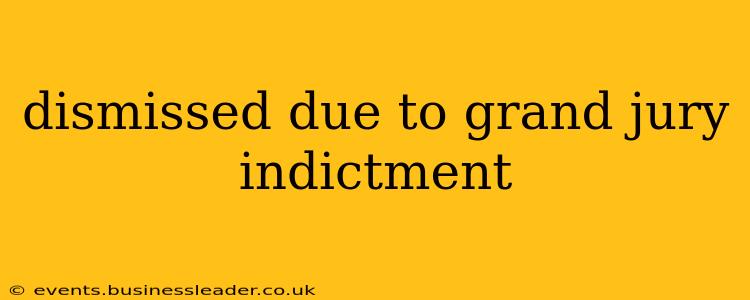A grand jury indictment is a serious matter, and having charges dismissed due to one can be confusing. This article clarifies the process and explores the implications of such a dismissal. We'll delve into what a grand jury indictment is, why charges might be dismissed after one, and what this means for the accused.
What is a Grand Jury Indictment?
A grand jury is a group of citizens convened to investigate potential criminal activity and determine whether there's enough evidence to formally charge someone with a crime. Unlike a trial jury, which decides guilt or innocence, a grand jury only decides whether there is probable cause to believe a crime has been committed and that the accused committed it. If the grand jury finds sufficient evidence (a "true bill"), an indictment is issued, formally charging the individual with the crime(s).
Why Are Charges Dismissed After a Grand Jury Indictment?
While seemingly counterintuitive, charges can be dismissed even after a grand jury indictment. This can happen for several reasons:
Insufficient Evidence:
Despite initially finding probable cause, further investigation by the prosecution might reveal weaknesses or contradictions in the evidence. This could lead to the prosecution deciding that they lack sufficient evidence to proceed to trial and secure a conviction. The case might be dismissed with prejudice (meaning it cannot be refiled) or without prejudice (allowing for the possibility of refiling charges later with additional evidence).
Procedural Errors:
Errors in the grand jury process itself can lead to a dismissal. This could involve violations of the defendant's rights, improper presentation of evidence to the grand jury, or flaws in the indictment itself. A judge might dismiss the charges if such errors are deemed significant enough to compromise the fairness of the proceedings.
Prosecutorial Discretion:
Prosecutors have the discretion to dismiss cases, even after an indictment. Various factors might influence this decision, including:
- New evidence exonerating the defendant: The emergence of compelling new evidence demonstrating the defendant's innocence would likely lead to a dismissal.
- Witness unreliability: Concerns about the credibility or reliability of key witnesses might cause the prosecution to reassess the strength of their case.
- Lack of resources: Budgetary constraints or a heavy caseload could prompt the prosecution to prioritize other cases.
- Plea bargains: The prosecution might dismiss the original indictment as part of a plea agreement with the defendant, where the defendant pleads guilty to lesser charges.
Changes in the Law:
Changes in relevant laws or legal interpretations might render the charges obsolete or unsustainable. The prosecution might choose to dismiss the case rather than pursue a legally questionable prosecution.
What Happens After Charges Are Dismissed?
The consequences of a dismissal depend on whether it's with or without prejudice:
- Dismissal with prejudice: The charges cannot be refiled. The case is closed, and the defendant is free from prosecution for that specific crime.
- Dismissal without prejudice: The charges can be refiled. The prosecution retains the option to pursue the case again if new evidence emerges or procedural issues are resolved.
Can I Sue After a Dismissal Due to a Grand Jury Indictment?
While a dismissal doesn't automatically entitle someone to sue, the circumstances surrounding the indictment and dismissal might create grounds for a lawsuit. For instance, a wrongful prosecution claim might be possible if the indictment was based on malicious or knowingly false information. It’s crucial to consult with a legal professional to assess the potential for legal action in your specific situation.
What Does a Dismissal Due to Grand Jury Indictment Mean for My Record?
The impact on your record depends on several factors, including the jurisdiction and whether the case was sealed or unsealed. In some instances, the indictment itself might remain on record, even after the dismissal. However, a dismissal generally has a less severe impact than a conviction. Consulting with a legal professional will provide clarity on the specific implications for your individual circumstances.
This information is for educational purposes only and should not be considered legal advice. Always seek guidance from a qualified legal professional for advice tailored to your specific situation.
